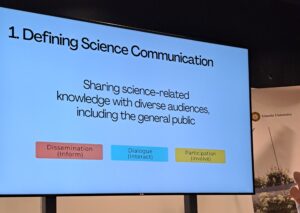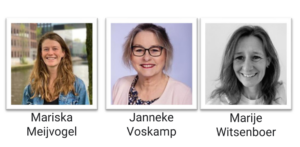Becoming Adults in a Changing World
Recap – Effective science communication workshop (DoY meet-up 11 Feb)
On the 11th of February at Utrecht Science Park, the Becoming Adults in a Changing World (BACW) community hosted the Dynamics of Youth (DoY) monthly meet-up with a workshop on effective science communication. The workshop was given by BACW’s newest postdoc Alexandra Masciantonio who holds a PhD in social psychology from the University of Lorraine and was previously a postdoctoral researcher at Maastricht University.

The workshop focused on enhancing effective science communication skills for researchers by exploring different types of formats, and addressed key challenges such as audience engagement, content creation, and institutional support, providing all attendees with practical solutions and useful resources. Alexandra started by prompting the room with the question – how do we define science communication? For different groups or stakeholders, science communication may look different and involve varying degrees of (1). dissemination, (2). dialogue or (3). participation, or in other words informing, interacting, or involving the public. The definition used by Alexandra during the workshop was as follows:
“Sharing science-related knowledge with diverse audiences, including the general public.”
We followed by discussing individual motivations for being a science communicator, from the enjoyment of it to the value of promoting open science. Many attendees in the room emphasized the scientific necessity of creating societal impact as well as an ethical responsibility to the broader public to give back as a publicly-funded institute. Moving forward, Alexandra presented a five-step plan to implement science communication in your own research practice which goes as follows:Other opportunities
- Define your goals – why do you want to do this?
- Identify your audience – to whom are you communicating your research?
- Assess resources – what resources do you have at your disposable?
- Choose the format – how or where you communicate determines your reach.
- Identify your preferences – following the last four steps, what is feasible for you?
In terms of assessing resources, many research teams may have an individual or two skilled at making videos or visuals (via Canva for example) or writing for a broader public via blog posts. If one does not already have the skills it is important to assess how much time one has to execute the proposed idea – is there time to learn new skills or reach out to other who are able to help you? Hire a graphic designer or filmmaker? Or look into applying a grant for science communication? In any case, at DoY itself we’re fortunate to have our own science communication team! Mariska Meijvogel, communications officer at DoY, Marije Witsenboer, science communication advisor at the Faculty of Social and Behavioural Sciences (FSBS), and Janneke Voskamp, senior advisor science communication at both DoY and FSBS, were all present at the meet-up. The three introduced themselves at the beginning of the workshop so that everyone knew where to find them should help be needed regarding anything related to science communication at DoY or FSBS.

When choosing a format, there are plenty of tips and resources for whatever form you decide suits your goals best. Writing a piece for your website or social media? Check out these tips on ‘Communicating Science Online’. Being interviewed for a piece in a journal or magazine? Here are some tips for how to talk to the media or maybe consider joining a media training by the UU’s press office. Many researchers have been getting creative lately with podcasts or videos: for an example you can check-out DoY’s own podcast Jong Geleerd where youth researchers talk about what youth need to grow up healthy, feel good about themselves and keep up in school. Or you can check out YoungXperts, a youth participation platform who on their social media uses short videos to highlight key findings of their research and involve young people to collaborate with them. Lastly, you can consider giving a public lecture to disseminate your research to a broader public at many different citizen science or public engagement festivals/talks across the country. Even the host of our science communication workshop, Alexandra, is currently busy with organizing the 2025 edition of the Pint of Science festival here in Utrecht. At this science communication festival, from the 19th to the 21st of May at different pubs, bars or cafés in Utrecht you can find researchers from all sorts of different disciplines sharing their findings to people from all walks of life. Make sure you save the date!

To round off, it is important to also evaluate our science communication efforts. When is such initiative adequate? According to Fischoff (2013), a science communication activity is done well if the information the audience needed was given, in a place they can access, and in a form they can comprehend. In considering a science communication activity its important to keep this in mind and acknowledge that there are limitations as well – simplifying your research for a broader audience may come with risk of inaccurately depicting your work, and there may be a lack of tangible rewards for making the investment to do so. Evaluation and reflection can help to make sure your next science communication activity meets the goals and intentions you or your team set for yourself. To help facilitate this, keep in mind the following questions we addressed earlier:
- What are your goals?
- Who is your target audience?
- What resources are available to you?
- Which formats cover the above questions?
- Among these formats, which one suits you the best?
We hope this workshop left our attendees feeling inspired to conduct their own science communication activities and with the knowledge and resources to know where and how to start. Alexandra is passionate about public engagement, and values the importance of fostering exchange between researchers and citizens, so should you have any questions regarding science communication feel free to reach out to her at a.masciantonio@uu.nl
We look forward to seeing you at future DoY meet-ups and who knows, maybe we will see you at the Pint of Science Festival this year in Utrecht, be it as an attendee or maybe one day, as a speaker!
Until next time,
The Becoming Adults in a Changing World team


